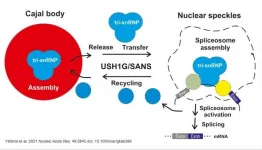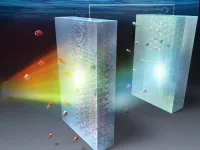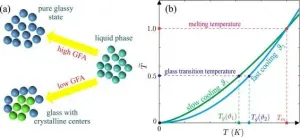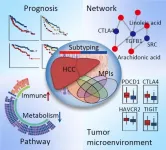Ecosystem destruction endangers local soy agriculture in Brazil
New research: Agriculture-driven ecosystem destruction turns up local temperatures, eats up billions in soy revenue in Brazil
2021-07-12
(Press-News.org) Destroying tropical ecosystems and replacing them with soybeans and other crops has immediate and devastating consequences for soybeans, according to new peer-reviewed research in the journal World Development. With 35.8 million hectare currently under soy cultivation in Brazil, extreme heat--which adjacent tropical forests help keep in check--has reduced soybean income by an average of approximately US$100 per hectare per year.
The study, Conserving the Cerrado and Amazon biomes of Brazil protects the soy economy from damaging warming, shows that protecting the Amazon and Cerrado can prevent the sort of high temperatures that damages the productivity of crops--estimated to cost the sector US$3.55 billion.
Another recent study found annual agricultural losses associated with deforestation-driven declines in precipitation at END
ELSE PRESS RELEASES FROM THIS DATE:
Study reveals ways to preserve employee morale during cost-cutting
2021-07-12
PULLMAN, Wash. - After cutbacks and layoffs, remaining employees were more likely to feel they were treated fairly if the companies invested in them - and morale was less likely to plunge, according to new research.
Those investments can include training for workers, team-building exercises or improving company culture. Even keeping workloads manageable after layoffs can help employees' job attitudes, according to the Journal of Organizational Behavior study.
"Whenever possible, cost-cutting is best combined with signals that people remain the firm's most prized asset," said Jeff Joireman, the study's co-author and a professor in Washington State University's Carson College of Business.
Researchers reviewed 137 previous studies examining job attitudes before, during and after cost-cutting ...
Humans can learn from animals and insects about impact of climate change
2021-07-12
If we pay closer attention to how birds, rabbits and termites transform their local living spaces in response to varying climate conditions, we could become much better at predicting what impact climate change will have on them in future.
This is according to a group of researchers* from the Universities of Montana and Wyoming in the United States, the University of Tours in France and Stellenbosch University (SU) in South Africa. They examined how animals' ability to respond to climate change likely depends on how well they modify their habitats, such as the way they build nests and burrows.
The findings of their study were published recently in the high-impact journal Trends in Ecology and Evolution.
"It's crucial that we continuously improve our ability to predict and mitigate the ...
Remarkable new insights into the pathology of Usher syndrome
2021-07-12
Human Usher syndrome (USH) is the most common form of hereditary deaf-blindness. Sufferers can be deaf from birth, suffer from balance disorders, and eventually lose their eyesight as the disease progresses. For some 25 years now, the research group led by Professor Uwe Wolfrum of the Institute of Molecular Physiology at Johannes Gutenberg University Mainz (JGU) has been conducting research into Usher syndrome. Working in cooperation with the group headed up by Professor Reinhard Lührmann at the Max Planck Institute for Biophysical Chemistry in Göttingen, his team has now identified a novel pathomechanism leading to Usher syndrome. They have discovered that the Usher syndrome type 1G protein SANS plays a crucial role in regulating ...
Giving a "tandem" boost to solar-powered water splitting
2021-07-12
Turning away from fossil fuels is necessary if we are to avert an environmental crisis due to global warming. Both industry and academia have been focusing heavily on hydrogen as a feasible clean alternative. Hydrogen is practically inexhaustible and when used to generate energy, only produces water vapor. However, to realize a truly eco-friendly hydrogen society, we need to be able to mass-produce hydrogen cleanly in the first place.
One way to do that is by splitting water via "artificial photosynthesis," a process in which materials called "photocatalysts" leverage solar energy to produce oxygen and hydrogen from water. However, the available photocatalysts are not yet where they need to be to make solar-powered water splitting economically feasible and scalable. ...
Theoretical model able to reliably predict low-temperature properties of compounds
2021-07-12
Co-authors Bulat Galimzyanov and Anatolii Mokshin (Department of Computational Physics) have developed a unique model that allows for a universal interpretation of experimental data on viscosity for systems of different types, while also proposing an alternative method for classifying materials based on a unified temperature scale.
The publication was funded by Russian Science Foundation's grant 'Theoretical, simulation and experimental studies of physical and mechanical features of amorphous systems with inhomogeneous local viscoelastic properties', guided by Professor Mokshin.
Using the developed viscosity model, scientists processed experimental data obtained for thirty different ...
Study sheds light on precise personalized hepatocellular carcinoma medicine
2021-07-12
A research group led by Prof. PIAO Hailong from the Dalian Institute of Chemical Physics (DICP) of the Chinese Academy of Sciences (CAS) identified hepatocellular carcinoma (HCC) subtypes with distinctive metabolic phenotypes through bioinformatics and machine learning methods, and elucidated the potential mechanisms based on a metabolite-protein interaction network and multi-omics data.
The study, published in Advanced Science on July 11, provides insights guiding precise personalized HCC medicine.
Metabolic reprogramming, which can promote rapid cell proliferation by regulating energy and nutrient metabolism, is considered to be one hallmark of cancer. It can impact other biological processes through complex metabolite-protein ...
Want to avoid running overuse injuries? Don't lean forward so much, says CU Denver study
2021-07-12
The ubiquitous overuse injuries that nag runners may stem from an unlikely culprit: how far you lean forward.
Trunk flexion, the angle at which a runner bends forward from the hip, can range wildly--runners have self-reported angles of approximately -2 degrees to upward of 25. A new study from the END ...
Heart risk 'calculators' overlook increased risk for people of South Asian ancestry
2021-07-12
DALLAS, July 12, 2021 -- People of South Asian ancestry have more than double the risk of developing heart disease compared to people of European ancestry, yet clinical risk assessment calculators used to guide decisions about preventing or treating heart disease may fail to account for the increased risk, according to new research published today in the American Heart Association's flagship journal Circulation.
About a quarter of the world's population (1.8 billion people) are of South Asian descent, and prior research has shown South Asians experience higher rates of heart disease compared to people of most other ethnicities.
To better understand the variables surrounding the heart disease risk for people of South Asian ancestry, researchers evaluated ...
Innovative gene therapy 'reprograms' cells to reverse neurological deficiencies
2021-07-12
A novel method of gene therapy is helping children born with a rare genetic disorder called AADC deficiency that causes severe physical and developmental disabilities. The study, led by researchers at The Ohio State University Wexner Medical Center and The Ohio State University College of Medicine, offers new hope to those living with incurable genetic and neurodegenerative diseases.
Research findings are published online in the journal Nature Communications.
This study describes the findings from the targeted delivery of gene therapy to midbrain to treat a rare ...
USC researchers discover better way to identify DNA variants
2021-07-12
USC researchers have achieved a better way to identify elusive DNA variants responsible for genetic changes affecting cell functions and diseases.
Using computational biology tools, scientists at the university's Dornsife College of Letters, Arts and Sciences studied "variable-number tandem repeats" (VNTR) in DNA. VNTRs are stretches of DNA made of a short pattern of nucleotides repeated over and over, like a plaid pattern shirt. Though they comprise but 3% of the human genome, the repetitive DNA governs how some genes are encoded and levels of proteins are produced in a cell, and account for most of the structural variation.
Current methods do not accurately detect the variations in genes in some repetitive ...
LAST 30 PRESS RELEASES:
DGIST identifies “magic blueprint” for converting carbon dioxide into resources through atom-level catalyst design
COVID-19 vaccination during pregnancy may help prevent preeclampsia
Menopausal hormone therapy not linked to increased risk of death
Chronic shortage of family doctors in England, reveals BMJ analysis
Booster jabs reduce the risks of COVID-19 deaths, study finds
Screening increases survival rate for stage IV breast cancer by 60%
ACC announces inaugural fellow for the Thad and Gerry Waites Rural Cardiovascular Research Fellowship
University of Oklahoma researchers develop durable hybrid materials for faster radiation detection
Medicaid disenrollment spikes at age 19, study finds
Turning agricultural waste into advanced materials: Review highlights how torrefaction could power a sustainable carbon future
New study warns emerging pollutants in livestock and aquaculture waste may threaten ecosystems and public health
Integrated rice–aquatic farming systems may hold the key to smarter nitrogen use and lower agricultural emissions
Hope for global banana farming in genetic discovery
Mirror image pheromones help beetles swipe right
Prenatal lead exposure related to worse cognitive function in adults
Research alert: Understanding substance use across the full spectrum of sexual identity
Pekingese, Shih Tzu and Staffordshire Bull Terrier among twelve dog breeds at risk of serious breathing condition
Selected dog breeds with most breathing trouble identified in new study
Interplay of class and gender may influence social judgments differently between cultures
Pollen counts can be predicted by machine learning models using meteorological data with more than 80% accuracy even a week ahead, for both grass and birch tree pollen, which could be key in effective
Rewriting our understanding of early hominin dispersal to Eurasia
Rising simultaneous wildfire risk compromises international firefighting efforts
Honey bee "dance floors" can be accurately located with a new method, mapping where in the hive forager bees perform waggle dances to signal the location of pollen and nectar for their nestmates
Exercise and nutritional drinks can reduce the need for care in dementia
Michelson Medical Research Foundation awards $750,000 to rising immunology leaders
SfN announces Early Career Policy Ambassadors Class of 2026
Spiritual practices strongly associated with reduced risk for hazardous alcohol and drug use
Novel vaccine protects against C. diff disease and recurrence
An “electrical” circadian clock balances growth between shoots and roots
Largest study of rare skin cancer in Mexican patients shows its more complex than previously thought
[Press-News.org] Ecosystem destruction endangers local soy agriculture in BrazilNew research: Agriculture-driven ecosystem destruction turns up local temperatures, eats up billions in soy revenue in Brazil




